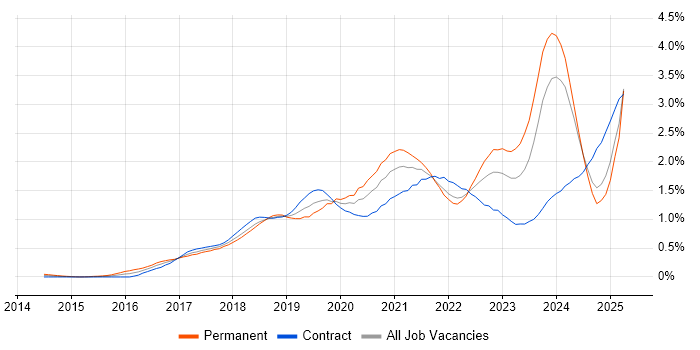Apache Kafka
UK > Scotland
The table below provides summary statistics and salary benchmarking for jobs advertised in Scotland requiring Kafka skills. It covers permanent job vacancies from the 6 months leading up to 12 February 2026, with comparisons to the same periods in the previous two years.
|
|
6 months to
12 Feb 2026 |
Same period 2025 |
Same period 2024 |
| Rank |
140 |
91 |
89 |
| Rank change year-on-year |
-49 |
-2 |
+11 |
| Permanent jobs citing Kafka |
9 |
48 |
166 |
| As % of all permanent jobs in Scotland |
0.30% |
2.01% |
4.11% |
| As % of the Libraries, Frameworks & Software Standards category |
2.48% |
8.60% |
13.01% |
| Number of salaries quoted |
4 |
24 |
63 |
| 10th Percentile |
- |
- |
£50,686 |
| 25th Percentile |
£52,500 |
£52,500 |
£52,500 |
| Median annual salary (50th Percentile) |
£60,000 |
£67,500 |
£70,576 |
| Median % change year-on-year |
-11.11% |
-4.36% |
+1.62% |
| 75th Percentile |
£74,375 |
£75,000 |
£73,091 |
| 90th Percentile |
£86,750 |
£108,750 |
£91,934 |
| UK median annual salary |
£97,500 |
£85,000 |
£80,000 |
| % change year-on-year |
+14.71% |
+6.25% |
-5.88% |
Kafka falls under the Software Libraries and Frameworks category. For comparison with the information above, the following table provides summary statistics for all permanent job vacancies requiring technical specification, industry standards, software libraries and framework skills in Scotland.
| Permanent vacancies with a requirement for technical specification, industry standards, software libraries and framework skills |
363 |
558 |
1,276 |
| As % of all permanent jobs advertised in Scotland |
12.28% |
23.39% |
31.62% |
| Number of salaries quoted |
134 |
334 |
602 |
| 10th Percentile |
£28,250 |
£33,750 |
£36,352 |
| 25th Percentile |
£28,438 |
£40,188 |
£45,000 |
| Median annual salary (50th Percentile) |
£60,000 |
£55,000 |
£60,000 |
| Median % change year-on-year |
+9.09% |
-8.33% |
- |
| 75th Percentile |
£70,000 |
£74,046 |
£72,433 |
| 90th Percentile |
£80,000 |
£93,778 |
£87,500 |
| UK median annual salary |
£65,000 |
£66,100 |
£61,500 |
| % change year-on-year |
-1.66% |
+7.48% |
-8.89% |
Kafka
Job Vacancy Trend in Scotland
Historical trend showing the proportion of permanent IT job postings citing Kafka relative to all permanent IT jobs advertised in Scotland.
Kafka
Salary Trend in Scotland
Salary distribution trend for jobs in Scotland citing Kafka.
Kafka
Salary Histogram in Scotland
Salary distribution for jobs citing Kafka in Scotland over the 6 months to 12 February 2026.
Kafka
Job Locations in Scotland
The table below looks at the demand and provides a guide to the median salaries quoted in IT jobs citing Kafka within the Scotland region over the 6 months to 12 February 2026. The 'Rank Change' column provides an indication of the change in demand within each location based on the same 6 month period last year.
| Location |
Rank Change
on Same Period
Last Year |
Matching
Permanent
IT Job Ads |
Median Salary
Past 6 Months |
Median Salary
% Change
on Same Period
Last Year |
Live
Jobs |
| Edinburgh |
-39 |
6 |
£60,000 |
-7.69% |
3 |
| Glasgow |
-1 |
3 |
- |
- |
7 |
Kafka
UK |
Kafka
Co-Occurring Skills & Capabilities in Scotland by Category
The following tables expand on the one above by listing co-occurrences grouped by category. They cover the same employment type, locality and period, with up to 20 co-occurrences shown in each category:


